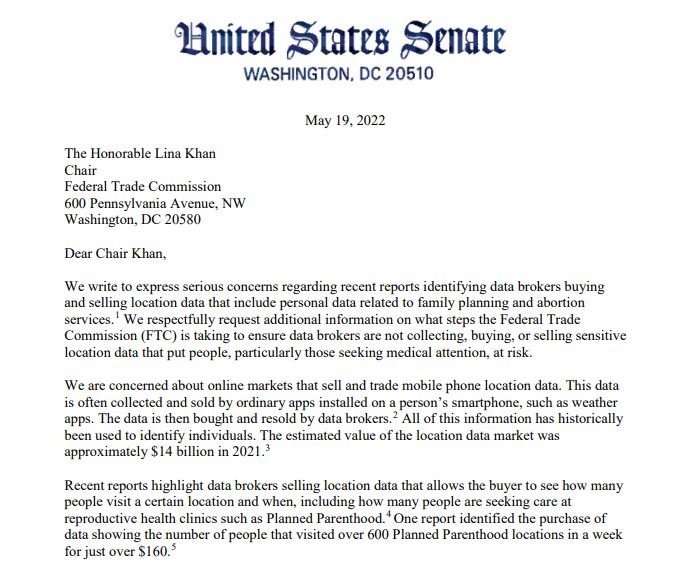A group of Democratic Party senators sent a letter to the U.S. Federal Trade Commission (FTC) urging them to take steps to protect women’s privacy after visiting reproductive health clinics. It was confirmed that some data brokers sell this information to third-party companies.
These reports come at a critical time for women’s health in the U.S., as the Supreme Court is expected to overturn the landmark 1971 Roe v. Wade ruling, which states that the U.S. Constitution’s Fourteenth Amendment protects abortion rights.

If this ruling is overturned, each state could set its legislation on reproductive health, which 13 states already have and where abortion is only allowed under certain conditions. Although legislators are already proposing measures to cut down this practice, women from these states would have to travel to another territory where abortion is legal.
The senators who signed this letter believe that, in the face of the imminent Supreme Court ruling, it is vital to take measures to protect the privacy of women who make decisions that should be between themselves, their families and doctors. As an example of these risks, senators mention the multiple reports on data brokers buying and selling data collected by mobile apps. These data could show the behaviors of women traveling to other states looking for reproductive health clinics, which could be of great interest to third parties.
Recently, Vice reported that companies could pay up to $160 million for databases containing location data of visitors to Planned Parenthood’s clinics across the U.S. over just one week.
The letter asks the FTC to establish an action plan to mitigate the potential harms related to this practice and define how the Commission is working with prosecutors and local governments to prevent companies of dubious reputation from accessing critical information of millions of women in the U.S.
In 2021, the estimated value of the location data market reached $14 billion, making it clear that these practices are profitable and use any loopholes in terms of service in applications for the extraction of sensitive data.
A representative for the FTC confirmed that the letter was received, although no further details were mentioned.
Feel free to access the International Institute of Cyber Security (IICS) websites to learn more about information security risks, malware variants, vulnerabilities, and information technologies.

He is a well-known expert in mobile security and malware analysis. He studied Computer Science at NYU and started working as a cyber security analyst in 2003. He is actively working as an anti-malware expert. He also worked for security companies like Kaspersky Lab. His everyday job includes researching about new malware and cyber security incidents. Also he has deep level of knowledge in mobile security and mobile vulnerabilities.











